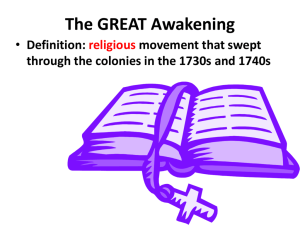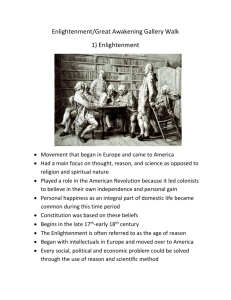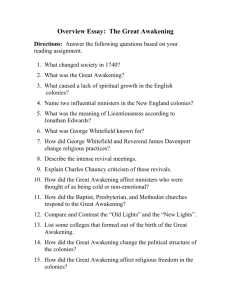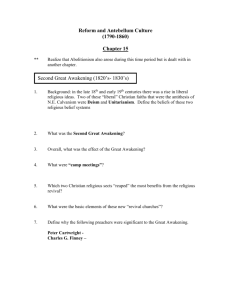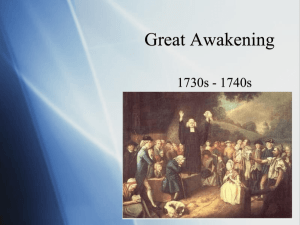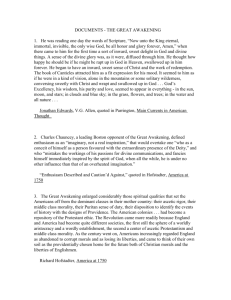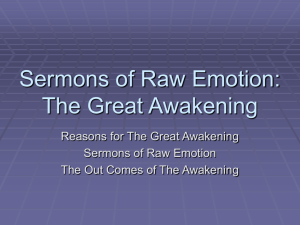The Great Awakening
advertisement
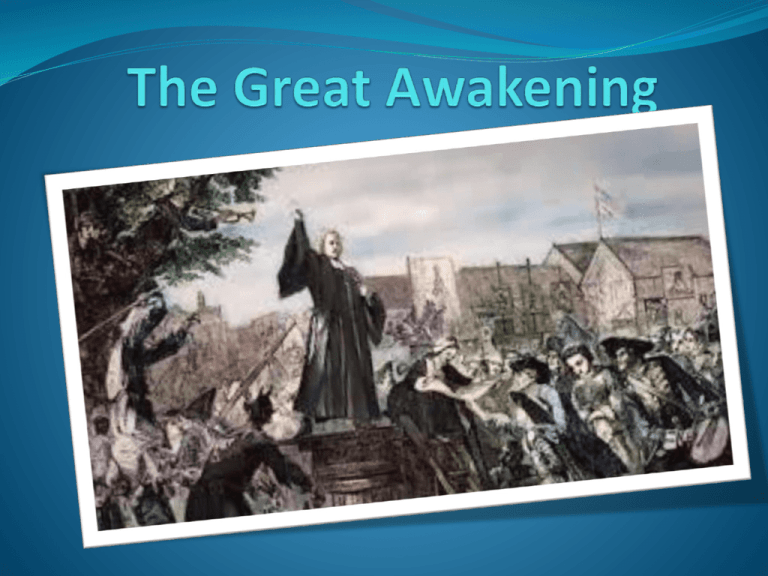
Definition of The Great Awakening The Great Awakening : It was a spiritual renewal that swept the American Colonies during 18 century led by evangelical Protestant ministers. It established an approach to which was characterized by great fervor and emotion in prayer. It allowed people to express their emotions more overtly in order to feel a greater intimacy with God. The Great Awakening - Dates The First Great Awakening 1725 -1750 The Second Great Awakening 1850–1900 The third Great Awakening 1880-1910 The fourth revivals Great Awakening 1960-1970 The Great Awakening - Map Origins of the Great Awakening Charles II attempted to erase all influences of Puritanism The Puritans had a reaction to the perceived corruption and secularism of the Church of England The Glorious Revolution of 1688 Denouncing divine right of kings and complacent obedience. Origins of the Great Awakening The colonists’ fear of Catholic and Stuart control vs the ideals of the Whigs to the New World. A rebellion against authoritarian religious rule which spilled over into other areas of colonial life. Charismatic personalities such as Whitefield and Tennent rolled through to deliver their messages. Leaders of the Great Awakening George Whitefield He came to Boston in 1740 He was supposed to deliver a counter-message against the cold rationalism In 1739, newspapers in New England carried stories of the crowds that would gather in England to hear him, and about his novel preaching style Whitefield was known to give sermons outside the churches . Leaders of the Great Awakening He was disappointed by the schools which opposed the revivalism sweeping through New England Leaders of the Great Awakening Jonathan Edwards (1703 –1758) He was a revivalist preacher, philosopher, and Congregationalist protestant theologian He refused to convert to the Church of England He was concerned about New Englanders who were becoming far too concerned with worldly matters He declared : "God was an angry judge, and humans were sinners!" What caused the Great Awakening? The causes : The Glorious Revolution of 1688 which led to eliminate the catholic domination. The Church of England as the reigning church of the country. Other religions, such as Catholicism, Judaism, and Puritanism, were subsequently suppressed. Religion became something of a pastime. What were the effects of the Great Awakening Revivalism taught people that they could confront religious authority. Religious power resided in their the hands of people rather than in the hands of the Church of England. Political power did not reside in the hands of the English monarch. A common vision of freedom from British control spread among the Colonists . The impact of the Great Awakening on the American Colonists American Identity There is not a single truth or a single church. The social effect of the variety of multi religion aspects helped to create a “national consciousness”. The chain of authority no longer ran from God to ruler to people, but from God to people to ruler. Government as Contract The growth of the notion of state rule as a contract with the people. The ideals of Puritanical covenant theology as the “social compact”. Religious Uniformity Religious pluralism within the colonies. The colonists adhered to no single denomination. religion from becoming a reality. Sentiments of self-governance : William Knox noted about the American drive for independence, “Every man being thus allowed to be his own Pope, he becomes disposed to wish to become his own King”. Shared Goals Religion as something communitarian – a form of social cooperation. Chiefly Protestant nation was a fear of Catholic domination. Interruption of Earthquakes in 1727 and 1755 the Antichrist they turned to the Catholics the pope to be the enemy during the French and Indian War. Shared Goals Anti-Catholicism was one of the most prominent traits in the colonies prior to the revolution An opposition to Roman Catholicism George III, who needed to be expelled from the colonies in order to bring forth the new age of righteousness Conclusion the Great Awakening provided the catalyst for political and military action necessary for fulfillment of religious expectations. The Great Awakening led Americans to confront the Catholics in every aspect until the break of against Britain . SOURCES www.great-awakening.com http://www.landofthebrave.info Youtube.com/the first great awakening Google.com images . Thanks to : The Audience who have listent. Me who have presented .
